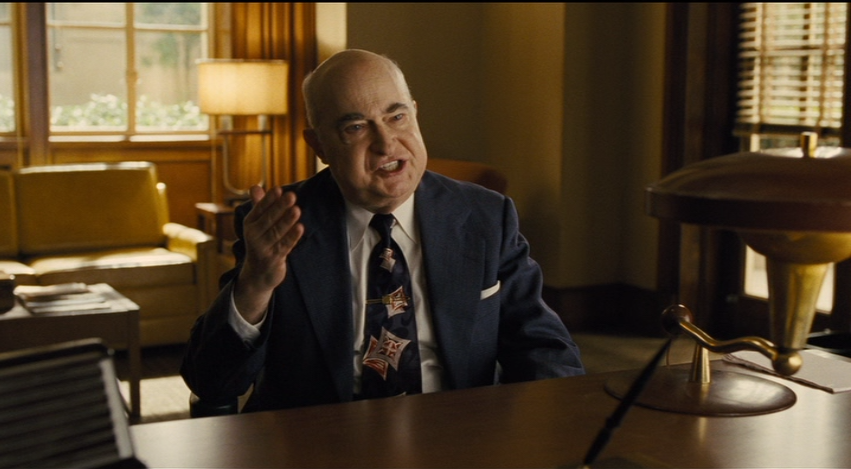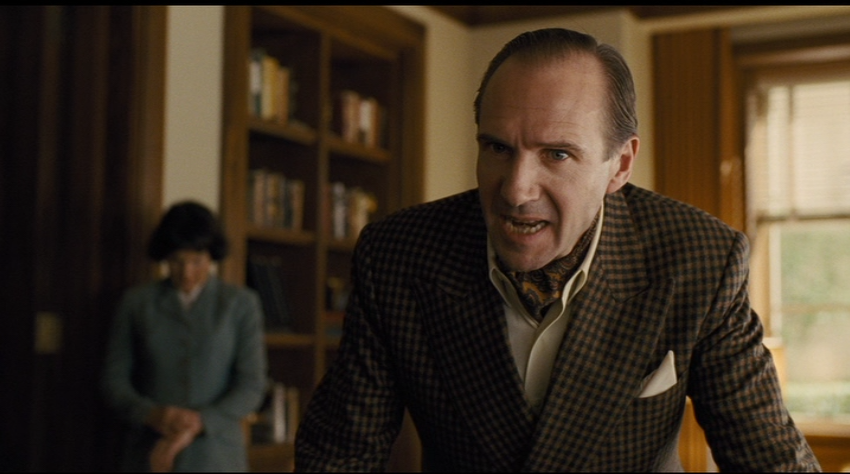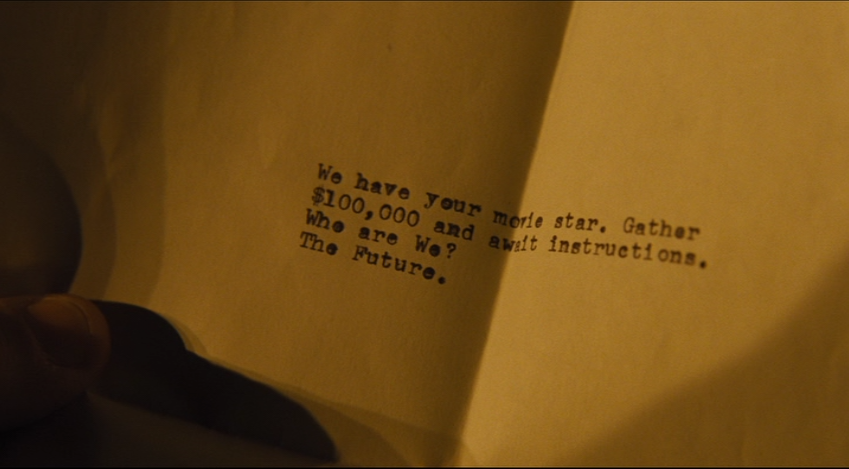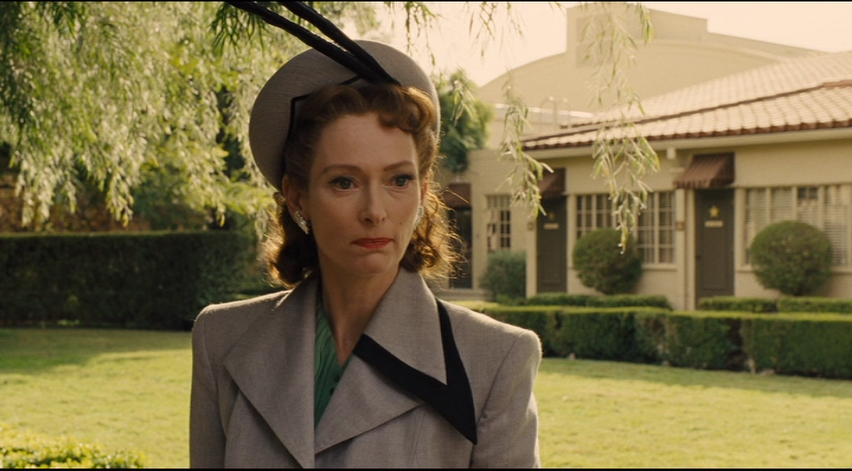Hail, Caesar! part 4
Eddie Mannix meets with the producer of Hail, Caesar! ATOTC to discuss the crisis of Baird Whitlock’s disappearance. The producer is, if anything, even more passionate about the project than Eddie. He’s not prepared to “shoot around” Baird, the “heart of the movie” depends on Baird’s face, his star power. And so a ticking clock is installed in Hail, Caesar!: Eddie must find and recover Baird Whitlock by tomorrow morning or else his tale of the Christ is forfeit. (I find it hard to believe that a project the size and scope of Hail, Caesar! ATOTC hasn’t already been beset by massive delays and cost overruns, but apparently Eddie Mannix runs a pretty tight ship.)
Eddie’s meeting with the producer of Hail, Caesar! ATOTC is interrupted by a furious Laurence Laurentz, who feels that Hobie Doyle is ruining his drawing-room comedy, which he calls “a real drama.” “Hobie Doyle can’t act,” spits Laurentz, to which Eddie Mannix calmly replies “Hobart Doyle is one of the biggest movie stars in the world.” I don’t know what Laurentz’s background is, but he feels that “based on a Broadway smash” is reason enough to re-cast Hobie. (“I begged you for Lunt,” says Laurentz, referring to Alfred Lunt, the Broadway titan. Eddie rolls his eyes, knowing that Lunt is 60 years old in 1951, and hasn’t been in a movie since the silent era.) If Eddie represents the status quo, Laurentz represents the past. So many early features, right up through the 1950s, were adaptations of stage plays, where cinema sought to recreate the experience of going to the theater. Laurentz’s movies (what we see of them) fit squarely into this mode, of “shots of people walking down the street and into a building, and then the rest of the movie takes place on a soundstage.” That’s the paradigm that the French New Wave challenged, and Laurentz is stuck in it. A creature of pure movement like Hobie Doyle, he feels, is an abomination. Again, the future will show who wins that struggle.
(There is, perhaps, a biblical aspect to Hobie Doyle’s story as well — he is Daniel, sent into the lion’s den.)
Speaking of the future, Eddie dashes over to a Chinese restaurant to meet with Mr. Cuddahy, a representative of Lockheed Aircraft. Lockheed, it seems, likes the way Eddie runs Capitol Pictures and wants him to run Lockheed in the same manner. Before they set to talking though, Mr. Cuddahy offers Eddie a cigarette. Cigarettes, remember, are Eddie’s only vice, which makes Cuddahy a kind of serpent in the garden of Hollywood. He’s offering Eddie both cigarettes and a way out of the status quo. “You need to think about the future,” he intones; the status quo isn’t going to be quo for much longer. Television looms on the horizon and movies — at least the kind of movies Eddie makes — aren’t going to be popular for much longer. Cuddahy describes motion pictures as “frivolous,” which strikes at the heart of what Hail, Caesar! is about. Yes, the movies Capitol Pictures makes are frivolous, sometimes desperately so, but Hail, Caesar! argues, strongly, that there is worth in those movies, even sacredness, perhaps because of their frivolousness. Narratively, the point isn’t whether or not Capitol’s movies are dumb, but whether or not they are the best movies Eddie can make. “We have some kooks, sure,” says Eddie, to which Cuddahy says “Of course they’re kooks, it’s all make-believe.” And, of course, he’s right — it is all make-believe. That’s what stories are: make-believe. Whereas Cuddahy describes Lockheed’s concerns as “serious.” How serious? Hydrogen-bomb serious. Armageddon serious. Eddie tells frivolous stories that entertain and, perhaps, enlighten, and Lockheed is offering the keys to the end of the world. That’s the future offered to Eddie by the very serious Mr. Cuddahy, who presents a photo of the Bikini Atoll test like it’s a French Postcard (perhaps calling back to the earlier “French Postcard” scene).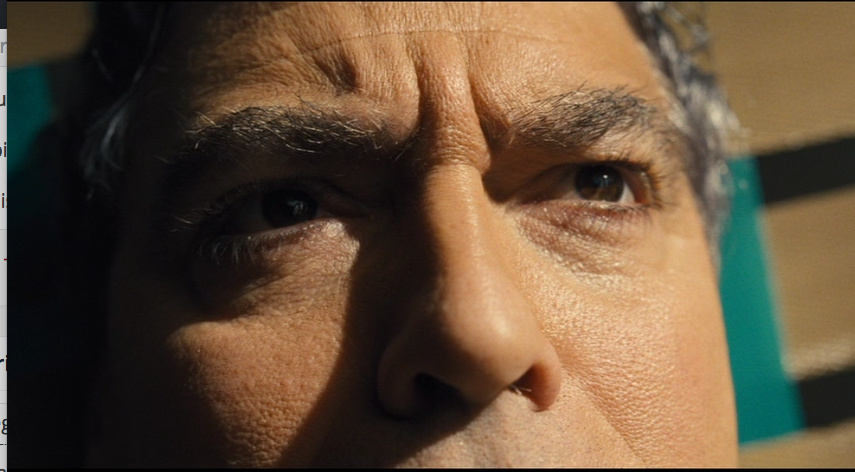
Baird Whitlock awakens to find himself taken prisoner in a gorgeous mid-century cliff house in Malibu. Like Lockheed’s Cuddahy, the men who have imprisoned him refer to themselves as “the future.” Like Saul on his way to Damascus, or like Antoninus in his duties in Palestine, Baird Whitlock is about to have his paradigm shifted.
Who has abducted Baird Whitlock? A group of communist screenwriters. How to characterize this group? Bitter intellectuals who think of themselves as incisive thinkers and champions of the proletariat, they hold their meetings in a millionaire’s house while eating cucumber sandwiches. They have a yapping lapdog (!) named Engels and they completely ignore the Hispanic maid who does the housekeeping. They are, in other words, phonies, a roomful of Barton Finks who believe they are carrying on the work of Marx while serving the needs of, literally, capita(o)l.
Like the religious leaders of the earlier scene, there is a good deal of disagreement among the communists about the nature of their ideals, featuring philosophical splits between body and brain, worker and owner (parasite), the past and the future. Like Cuddahy, they not only think of themselves as the future, they also disdain “make-believe.” The thrust of their argument is that Capitol Pictures, as a capitalist institution, can be exploited to finance its own destruction. Baird, the millionaire movie star (the “prestige talent”) who sees himself as a champion of “the little guy” (but probably more in the way Norma Desmond meant it), finds himself willing to go along with the blatantly nonsensical things the communists spew.
Back at the studio, Eddie receives a ransom note for Baird. It’s signed “The Future,” and yet Eddie does not automatically suspect Lockheed. Kidnapping doesn’t seem to be Lockheed’s style. And so we learn that the communist screenwriters’ goal is to ransom Capitol’s movie star back to them for $100,000, thus “financing their own destruction.” Eddie responds immediately, getting $100,000, literally, from petty cash. $100,000 is nothing to Eddie, or to Capitol, which either makes the communist kidnappers chumps, or else proves they are right. Literally, Eddie’s biggest concern is how large a container he needs for that much money.
As Eddie is on his way to pick up the cash, he is accosted by Thora Thacker, a gossip columnist, who is planning to run a story on Baird. Not the story about how he disappeared from the set of the studio’s tentpole picture, mind you, but another story about an as-yet-undetermined dark chapter of Baird’s past. And we are reminded that Eddie’s job as storyteller isn’t just making movies, but creating and maintaining images, for his stars and for the studio. Each one of his actors has at least one image problem: Baird is a drunk and philanderer, DeAnna is pregnant and unmarried, Hobie is a cowboy that Mr. Schenck wants to make an actor. (He’s got one more actor with an image problem that we haven’t met yet.) “People don’t want the facts, they want to believe!” cries Eddie, which, perhaps ironically, makes him also a religious leader, and Thora a heretic who wants to bring his church down.
